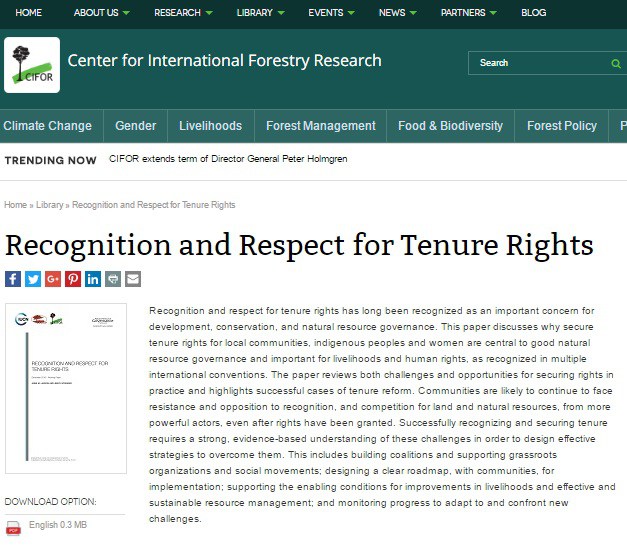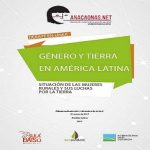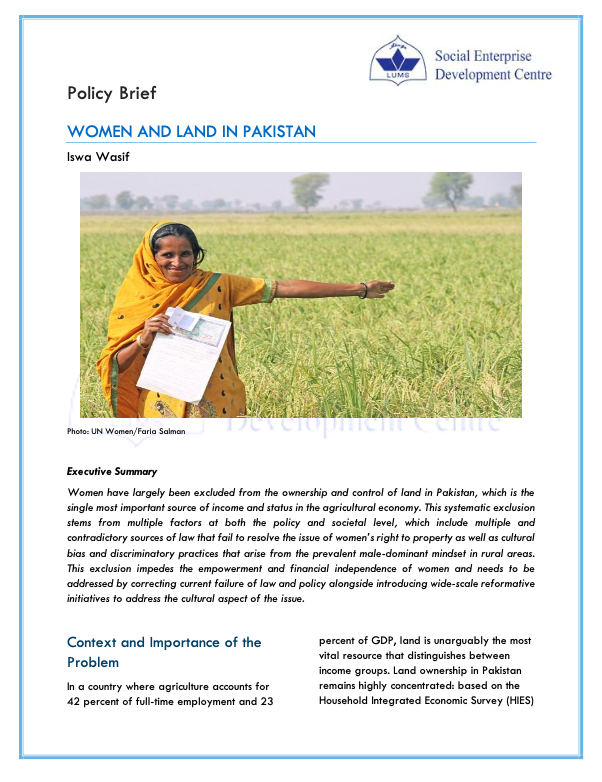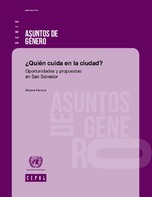Recognition and Respect for Tenure Rights
Recognition and respect for tenure rights has long been recognized as an important concern for development, conservation, and natural resource governance. This paper discusses why secure tenure rights for local communities, indigenous peoples and women are central to good natural resource governance and important for livelihoods and human rights, as recognized in multiple international conventions. The paper reviews both challenges and opportunities for securing rights in practice and highlights successful cases of tenure reform.
Debate en línea. Género y tierra en América Latina. Situación de las mujeres rurales y su lucha por la tierra
Sulá Batsú y Land Portal llevaron a cabo, a través de Anacaonas.net y LandPortal.info, el debate en línea Género y Tierra, el cual constituyó un espacio para reflexionar acerca del derecho, la tenencia y el uso de la tierra; profundizando en el análisis crítico sobre si el derecho a la tierra asegura el empoderamiento, y discutiendo acerca del papel de la mujer como protectora de la tierra y apoderada para garantizar su sostenibilidad.
Power and Potential: A Comparative Analysis of National Laws and Regulations Concerning Women's Rights to Community Forests
Up to 2.5 billion people hold and use the world’s community lands, yet the tenure rights of women—who comprise more than half the population of the world’s Indigenous Peoples and local communities—are seldom acknowledged or protected by national laws.
Women's empowerment and gender equity in agriculture: A different perspective from Southeast Asia
Women's empowerment is considered a ‘prerequisite’ to achieving global food security. Gender systems, however, are diverse and complex. The nature and extent of gender inequity and the conditions necessary to empower women vary across countries, communities and regions. The study of different gender systems is thus fundamental to capture cross-cultural variations in gender specific needs and constraints to effectively address gender gaps.
Women and Land in Pakistan
Women have largely been excluded from the ownership and control of land in Pakistan, which is the single most important source of income and status in the agricultural economy. This systematic exclusion stems from multiple factors at both the policy and societal level, which include multiple and contradictory sources of law that fail to resolve the issue of women’s right to property as well as cultural bias and discriminatory practices that arise from the prevalent male-dominant mindset in rural areas.
Gender, agriculture and rural development in Armenia
Gender equality is key to eliminating poverty and hunger, and this has been demonstrated by FAO throughout its research across the world. FAO is committed to interventions that seek to reduce gender inequalities and this report has been produced as part of its eff orts to generate evidence and knowledge in compliance with FAO’s Policy on Gender Equality (FAO, 2013a). It is only through closing the gender gap that strategies on sustainable agriculture and rural development can reach their full potential.
Land Policy Report. Policy Trends and Emerging Opportunities for Strengthening Community Land Rights in Africa
Identifies the drivers of the land use changes that have displaced millions of rural people and continue to threaten millions more – particularly women; it unpacks the key land policy guidelines and why they have so far failed to ‘stick’ on the ground, and it sets out 14 actions to get to grips with the problem and push forward community land rights across Africa.
How commercial farms are ripping apart Zambian communities
Some commercial farmers in Serenje District, Central Province of Zambia, have acquired thousands of hectares while ignoring laws meant to prevent forced evictions. Some have used bulldozers to forcibly evict residents whose families have farmed the land for generations. This has been devastating for the communities and particularly hard on women.
¿Quién cuida en la ciudad? Oportunidades y propuestas en San Salvador
Las demandas de cuidado y de autonomía económica de las mujeres plantean un particular desafío para las políticas locales de vivienda, planificación, infraestructura, transporte, actividad económica, seguridad y espacio público, participación y toma de decisiones, entre otras. Es decir presentan un reto de gran magnitud para el desarrollo urbano. El presente estudio pretende contribuir al debate sobre políticas de cuidados enfocando la mirada en las ciudades latinoamericanas, en esta ocasión en la ciudad San Salvador.
¿Quién cuida en la ciudad?: aportes para políticas urbanas de igualdad
Ante los actuales desafíos que enfrenta América Latina, los instrumentos acordados en el marco de las Naciones Unidas ofrecen una base importante para la implementación de políticas públicas innovadoras. En la Agenda 2030 para el Desarrollo Sostenible se reconocen la igualdad de género y la autonomía de las mujeres como factores fundamentales para avanzar hacia el desarrollo sostenible. De conformidad con la Nueva Agenda Urbana, se debe garantizar a las mujeres la igualdad de derechos en todas las dimensiones que afectan a las ciudades.









